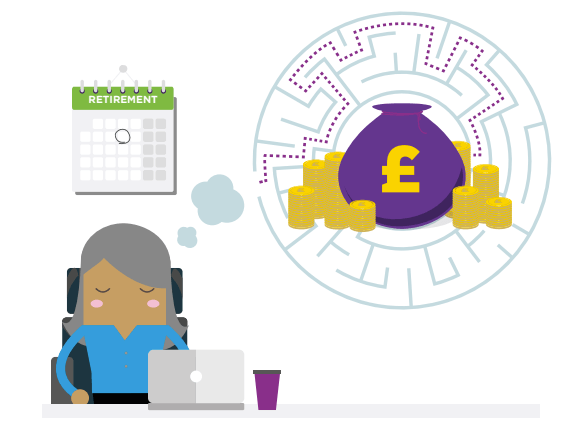
Nikki Bond, Interim Head of Research and Policy, Money and Mental Health Policy Institute
The pensions maze: experiences of retirement planning for people with mental health problems
6 June 2023
- People with mental health problems face barriers to saving enough for retirement, including employment struggles and reduced savings
- Those of us with mental health problems are less likely to be prepared for retirement and can find it difficult to engage with retirement planning services
- Retirement planning services often do not cater to people’s needs, leading to confusion and lower levels of preparedness for retirement
- Targeted action is needed to improve support, messaging, delivery channels, and staff training for people with mental health problems.
Saving for retirement can be tricky for all of us. Prioritising putting aside money now for our future selves can be hard – particularly when rising costs make affording the everyday essentials we need today challenging. But for those of us with mental health problems, the barriers to saving for retirement and making the most of our pension savings can be exacerbated.
Research we published today presents new evidence on just how acute these challenges can be. Our research finds that millions of people with mental health problems face a financial cliff edge when they retire due to difficulties building pension savings and problems accessing information and guidance services that are intended to support us to make decisions about our pensions.
Barriers to saving for retirement
People with mental health problems face barriers to saving enough for retirement. Difficulties with poor mental health can mean people struggle to stay in work and need extended periods off. Others might need to work reduced or flexible hours to manage their mental health. These barriers can combine and lead to lower and patchier savings, with some people missing out on employer pension contributions altogether.
Achieving good retirement outcomes isn’t just about how much money a person has in their pension pot though. People need access to information and guidance to make the most of the savings they do have.
People with mental health problems are less likely to be prepared for retirement
However, our research finds that people with mental health problems are less likely to be prepared for retirement than those without mental health problems. People aged 45-64 are at a crucial stage for retirement planning, yet more than a quarter of people with mental health problems reported they did not know they had to choose how to take money from their pension – compared to just over one in six of those without mental health problems.
Accessing pensions information and guidance is crucial but can be challenging
Despite the need for support, symptoms of mental health problems, such as memory problems, communication difficulties and low mood, can make it harder to engage with retirement planning services or to make decisions about how and when to use pension savings.
Persistent feelings of suicidality and ambivalence about living can mean planning for the long term feels irrelevant. Shame and fear of judgement can also make engaging with retirement planning services overwhelming.
“For many years, I was severely suicidal and made repeated attempts. During those years, I wasn’t able to work and obviously did not pay into a pension. I did not expect to live to retirement age, so I thought a pension was irrelevant to me.” Expert by experience
Retirement planning services are ill-suited to people’s needs
People with mental health problems also told us how the design and promotion of the help that is available contributed to those difficulties. Many people don’t know where to turn for help, and routes into retirement planning services are unclear. People told us how adverts for services intended to support with decisions around retirement give the impression that they are “not for them”.
Similarly, the channels through which retirement planning services are offered can be hard for people with mental health problems to navigate. Each retirement planning service is delivered via a limited range of communication channels, each offering different support levels. This can make it tricky for people with mental health problems to know which service and channel best suits their needs.
Without access to the right support, people risk making sub-optimal retirement decisions. When this coincides with an episode of mental health crisis, the consequences can be devastating.
“I’ve cashed in my pension when I’ve been hypermanic and spent it on god knows what. I don’t own my own home I live in council housing.” Expert by experience
Improving the system to work better for people with mental health problems
People with mental health problems require targeted action to help them save sufficiently for retirement. Pension information and guidance services should cater to their needs.
To achieve this, we make three key recommendations for the pensions information and guidance sector:
- Ensure pensions information and guidance messaging resonates with people with mental health problems by making clear it can support issues like low savings, questions about eligibility for the State Pension and interactions with benefit entitlement.
- Expand the range of delivery channels, ensuring pensions information and guidance are provided in multiple formats, including videos and interactive webinars
- Train customer-facing staff to know how to support people with mental health problems whose symptoms can impact their ability to understand, communicate and make decisions.
Now is the perfect moment for pensions providers, retirement planning services, government departments and bodies to reflect on how the needs of people with mental health problems are being met, and take steps to ensure that everyone has access to good retirement outcomes.
